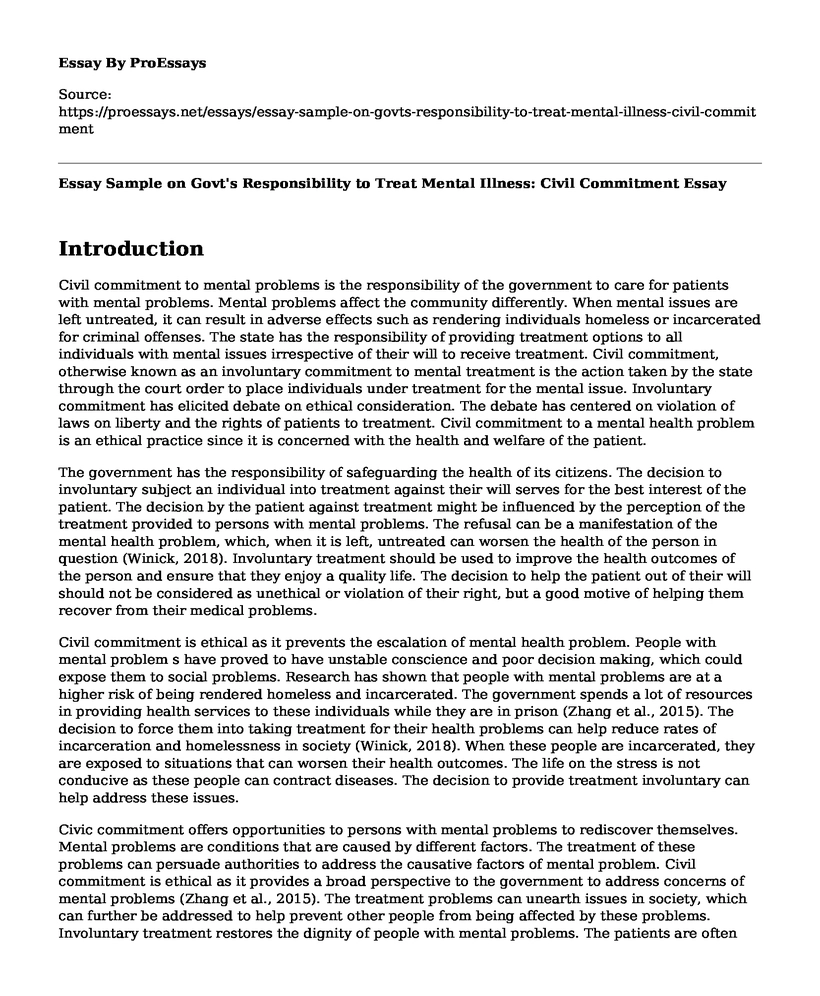Introduction
Civil commitment to mental problems is the responsibility of the government to care for patients with mental problems. Mental problems affect the community differently. When mental issues are left untreated, it can result in adverse effects such as rendering individuals homeless or incarcerated for criminal offenses. The state has the responsibility of providing treatment options to all individuals with mental issues irrespective of their will to receive treatment. Civil commitment, otherwise known as an involuntary commitment to mental treatment is the action taken by the state through the court order to place individuals under treatment for the mental issue. Involuntary commitment has elicited debate on ethical consideration. The debate has centered on violation of laws on liberty and the rights of patients to treatment. Civil commitment to a mental health problem is an ethical practice since it is concerned with the health and welfare of the patient.
The government has the responsibility of safeguarding the health of its citizens. The decision to involuntary subject an individual into treatment against their will serves for the best interest of the patient. The decision by the patient against treatment might be influenced by the perception of the treatment provided to persons with mental problems. The refusal can be a manifestation of the mental health problem, which, when it is left, untreated can worsen the health of the person in question (Winick, 2018). Involuntary treatment should be used to improve the health outcomes of the person and ensure that they enjoy a quality life. The decision to help the patient out of their will should not be considered as unethical or violation of their right, but a good motive of helping them recover from their medical problems.
Civil commitment is ethical as it prevents the escalation of mental health problem. People with mental problem s have proved to have unstable conscience and poor decision making, which could expose them to social problems. Research has shown that people with mental problems are at a higher risk of being rendered homeless and incarcerated. The government spends a lot of resources in providing health services to these individuals while they are in prison (Zhang et al., 2015). The decision to force them into taking treatment for their health problems can help reduce rates of incarceration and homelessness in society (Winick, 2018). When these people are incarcerated, they are exposed to situations that can worsen their health outcomes. The life on the stress is not conducive as these people can contract diseases. The decision to provide treatment involuntary can help address these issues.
Civic commitment offers opportunities to persons with mental problems to rediscover themselves. Mental problems are conditions that are caused by different factors. The treatment of these problems can persuade authorities to address the causative factors of mental problem. Civil commitment is ethical as it provides a broad perspective to the government to address concerns of mental problems (Zhang et al., 2015). The treatment problems can unearth issues in society, which can further be addressed to help prevent other people from being affected by these problems. Involuntary treatment restores the dignity of people with mental problems. The patients are often viewed and perceived negatively in society (Winick, 2018). The treatment can help the patients to recover and promote positive view and perception towards mental illness. Metal problems are just like other health conditions which must be addressed and different levels of governance.
References
Winick, B. J. (2018). A therapeutic jurisprudence model for civil commitment. In Involuntary detention and therapeutic jurisprudence (pp. 23-54). Routledge.
Zhang, S., Mellsop, G., Brink, J., & Wang, X. (2015). Involuntary admission and treatment of patients with a mental disorder. Neuroscience Bulletin, 31(1), 99-112.
Cite this page
Essay Sample on Govt's Responsibility to Treat Mental Illness: Civil Commitment. (2023, Jan 16). Retrieved from https://proessays.net/essays/essay-sample-on-govts-responsibility-to-treat-mental-illness-civil-commitment
If you are the original author of this essay and no longer wish to have it published on the ProEssays website, please click below to request its removal:
- Paper Example on Unique Characteristics of Schizophrenia
- Problem Solution Essay on Stress
- Essay Sample on Group Therapy: Exploring Interpersonal Relationships in Group Contexts
- Psychiatrists: Medical Experts in Mental Health Care - Essay Sample
- Tristan & Iseult: Unfailing Loyalty & True Love in Medieval Times - Research Paper
- Essay on Panic Disorder Prevalence in Primary Care: Addressing Mental Health Needs
- Emotional Intelligence: A Guide for Nurses - Essay Sample







